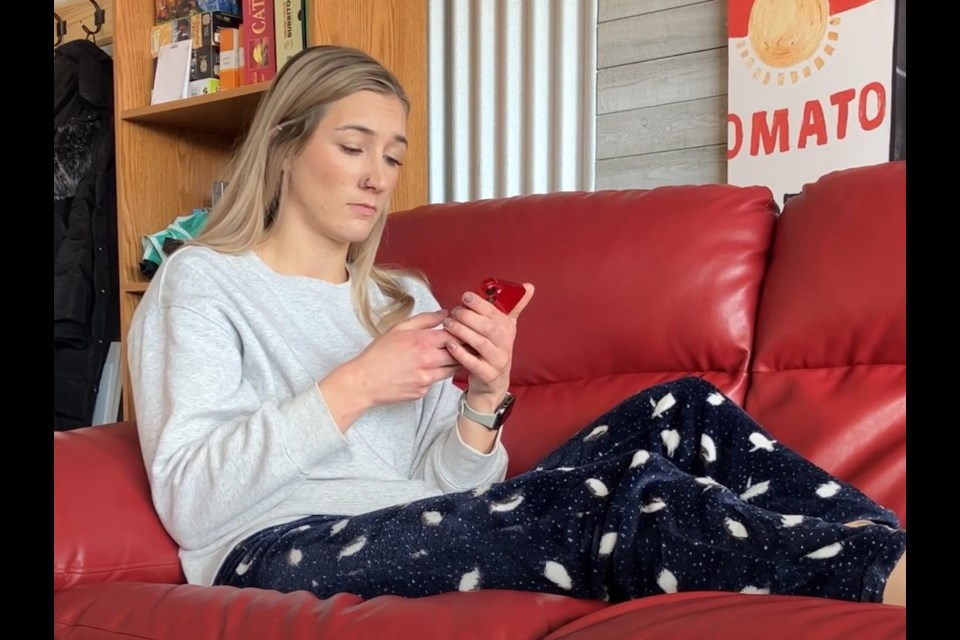SUNDRE – From a lack of motivation to anxiety and social isolation to anger management issues that can quickly boil over to a regrettable road rage incident, there are numerous mental health hurdles facing many people.
A new series of locally-produced and easily consumable advice videos aims to equip anyone who is so inclined with some helpful tips on developing healthy coping strategies.
The project is a result of a collaborative partnership among Sundre’s Greenwood Neighbourhood Place (GNP) Society, Alberta Health Services (AHS), and Peak Theatre Players, who provided actors to recreate the different kinds of mental health issues people face on a daily basis.
It was made possible through Sundre Family and Community Support Services as well as the Rural Mental Health Project Community grant program, which offers funding to community-based projects that promote mental health and well-being in rural and remote communities across Alberta, said Sari Werezak, GNP’s executive director.
A group of volunteer community members who meet under the banner of Sundre Rural Mental Health Project (RMHP) to discuss mental health in the community context coordinated by GNP initially came up with action plans to address some issues that had been identified, Werezak told the Albertan by email in response to follow-up questions, including how the program came about.
Among the needs identified was to also focus on further developing and enhancing the society’s communications strategy, she added.
“We know there are lots of great things that can build positive mental health in our community, but people don’t know about them,” she said, adding some residents don’t always know where to turn either to participate in programs or access resources.
“The challenge is reaching residents where they are at and creating a buy-in to want to help themselves,” she said.
With that in mind, the intent behind the new series – dubbed Mental Health in a Moment for being quickly consumable video clips that teach techniques in about or even fewer than five minutes – is to create an appeal to both “young people or adults who are almost constantly on their devices and may only watch videos as their source of information,” she said.
“Many people won’t necessarily read articles to invest time into building their mental health,” said Werezak, adding residents might expect to see throughout the community some posters in public and participating business’s washroom stalls promoting the new initiative with a QR code to further facilitate ease of access.
“The hope is people might see themselves and use the QR code to take them to the videos,” she said.
In response to being asked whether the videos will indefinitely remain available as a permanent new resource or if they are perhaps a more temporary promotional measure to place the spotlight on and raise awareness about mental health, Werezak said the clips will remain available on GNP’s website and added the poster campaign would soon be underway.
“We hope that people will somehow see themselves on the posters and click on the QR code, which links to the video clips’ landing page,” she said, adding “the poster was designed to hopefully draw them in, as it reflects some of the types of industry people who work rurally.”
Werezak was pleased with the end result and said, “I hope people will smile and maybe see some familiar faces.”
Members of the Sundre RMHP brainstormed the concept and extended an olive branch for other community partners to get involved in making the videos a reality, she said.
A group of actors with Peak Theatre Players “happily jumped onboard and did a great job,” she said, adding local AHS mental health therapist Paul Shippy – who plays roles in several clips – provides some excellent insight in the short educational videos.
Offering words of advice to anyone in the community who thinks either they or someone they know might benefit from considering some of the tips outlined in the videos, Werezak said, “We can all build our own mental health if we want to, and if we are willing to invest a bit of time to learn how.”
While there are of course instances when the professional help of a counsellor or therapist might be the best option, a person does not always necessarily need to automatically visit a mental health worker for every struggle, she said.
“None of us are alone in it; we all have mental health,” she said. “There are some proven strategies for whenever we notice we aren’t doing so well.”
However, knowledge is one thing; effectively translating that information into practice is another.
“It’s not just a matter of knowing the tools, it’s applying them,” she said, adding that includes herself.
Visit mygnp.org and click on the “Resources” tab on the main homepage, which will direct the user to a Community Resources section under which the new series of videos can be found under the tab “Mental Health Tools”.



